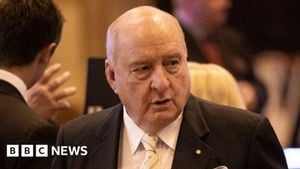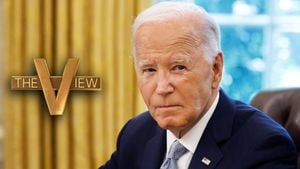Robert F. Kennedy Jr. has recently grabbed headlines again, but this time his focus is on something many Americans take for granted: fluoride in their drinking water. Kennedy, newly appointed by President Trump to lead the Department of Health and Human Services, has articulated strong opposition to the public health practice of adding fluoride to water supplies, calling it "industrial waste" and linking it to various serious health issues such as arthritis, bone cancer, and neurodevelopmental disorders.
The timing of Kennedy's statements couldn't be more pivotal, with stock prices for dental companies reacting positively to the prospect of his influence. Shares of dental product manufacturers like Henry Schein, Dentsply Sirona, and Envista have surged amid speculation about increased demand for dental services if fluoride is eliminated from the public water supply. Investors are betting on the idea sparked by Kennedy's nomination: if fluoride is removed, more people will need to visit the dentist due to increased tooth decay.
Fluoride has been part of public drinking water since the 1940s, and its primary purpose is cavity prevention. According to the Centers for Disease Control and Prevention (CDC), the optimal amount of fluoride detected is about zero point seven milligrams per liter—akin to three drops of water added to a 55-gallon barrel. Prominent health organizations have long touted water fluoridation as one of the greatest public health achievements of the past century.
Despite the overwhelming consensus among health experts about the safety and effectiveness of fluoridation, the debate around its use continues. Some studies have raised concerns about the potential effects of fluoride on children's IQ; this has reignited discussions about water fluoridation and public health policies, especially now with Kennedy at the helm of the HHS.
"What we're seeing here is speculation," explained Don Bilson, head of event-driven research at Gordon Haskett. He elaborated, "The thought here is RFK will bring to HHS a voice favoring the reduction of fluoridation. This could lead to more dental visits due to increased tooth decay."
It's not just speculation impacting the stocks; it's also Kennedy's controversial stance as a known vaccine skeptic. His nomination has rattled healthcare stocks, with pharmaceutical companies and health insurers feeling the tremors as investors reevaluate their positions amid fears of increased scrutiny on medical practices influenced by political sentiments.
Some local governments have already started responding to Kennedy's anti-fluoride rhetoric. For example, Winter Haven, Florida, swiftly voted to eliminate fluoride from its drinking water, with local officials citing Kennedy's statements as part of their decision-making process. City Commissioner Brad Dantzler stated, "We may be at the front of it, but this issue is coming just based upon current events." Such moves indicate an alarming trend among municipalities toeing the line set by federal administrators.
Many dental and public health experts voiced their concerns over these developments. Diana Winters, deputy director at the Resnick Center for Food Law & Policy at UCLA, noted, "The facts are clear; fluoridation has been enormously beneficial over the past seventy years, significantly reducing dental disease—especially among children who lack regular access to dental care."
The legal framework surrounding fluoride use is also quite complex. While there is no federal mandate to add fluoride to drinking water, guidelines from the Public Health Service influence state and local policies. Many municipalities opt to follow federal recommendations, but some states enforce laws requiring fluoride addition.
The controversy surrounding fluoride isn't new. Resistance to water fluoridation has existed since the 1950s, fueled by groups like the John Birch Society, which propagated conspiracy theories alleging it was part of communist brainwashing. This historical backdrop gives credence to concerns about the impact of conspiracy-driven narratives on health policies, especially with figures like Kennedy taking up such causes.
Despite the backlash, the public health community remains steadfast. Dr. Aaron Yancoskie, associate dean of Touro College of Dental Medicine, stressed the importance of adhering to the scientific consensus surrounding fluoride: "There is excellent data proving fluoride is safe and effective at decreasing cavities for over seven decades." He emphasized the need for sound medical guidance instead of politically motivated rhetoric.
While the spotlight may currently shine on fluoride, Kennedy's influence could extend to other areas of public health. His criticisms of vaccine efficacy and safety principles raise questions about how comprehensive changes to health regulations under his leadership could affect vaccines and other public health initiatives. This intersection of politics and public health continues to deepen the complexity of healthcare conversations across the nation.
The potential removal of fluoride from drinking water is not merely about oral health; it's indicative of larger conversations taking place about trust, science, and health policy shaping under political ideologies. Amidst these pressures, health professionals are urging communities to hold on to the science and prioritize public health over the mixed narratives propagated by public figures.
Despite the controversies and stock market speculations, one thing remains clear: the future of fluoride and public health under Kennedy’s leadership at HHS may well challenge the consensus established over decades. It will undoubtedly lead to findings and debates as the public health community works to advocate for what they believe is scientifically justified—continuing to provide safe, effective preventive care to all populations.
Investors remain watchful, knowing the real impact of Kennedy's nomination could reshape not only their portfolios but also the historical achievement of safe water fluoridation. This saga is one worth keeping tabs on as it blends public health, political narratives, and financial interests—a potential storm brewing on the horizon for America's dental health policies.



